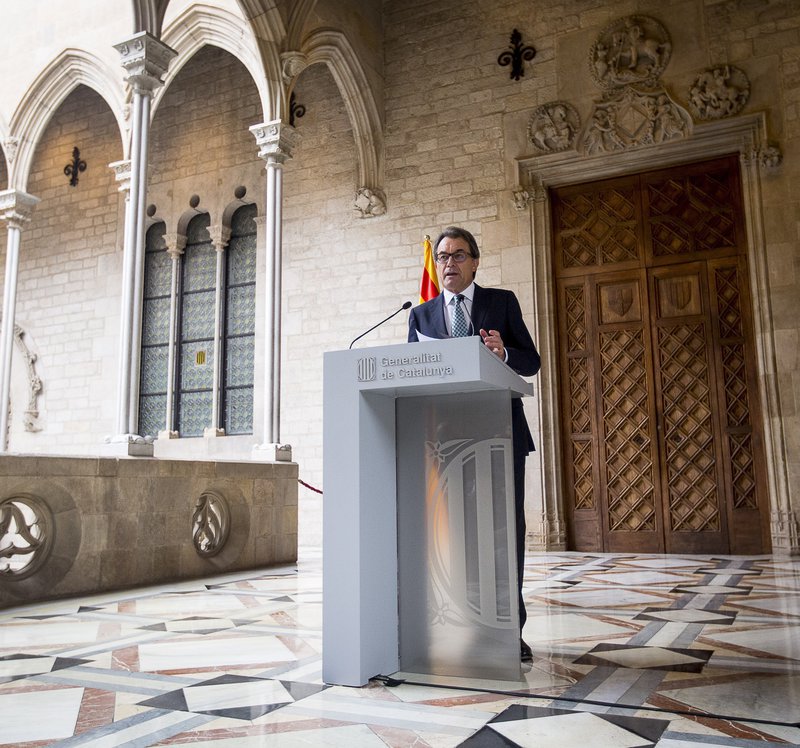What now on November 9?
After Artur Mas cancels the long-awaited referendum on sovereignty in favour of an alternative vote, pressure builds on the Catalan president to call early elections
At this point, at the start of November, the only thing that is clear in the Catalan sovereignty process is that the original November 9 referendum approved by the Catalan parliament and presidential decree will not take place. After the Catalan president Artur Mas cancelled the vote last month, following the TC constitutional court's suspension of the referendum legislation and decree emanating from the Catalan parliament, the pro-sovereignty parties have still not found a course of action to provoke the same level of unity as the now cancelled referendum.
One option is the alternative vote proposed by the Catalan government. No sooner did Mas announce the suspension of the referendum, than the president put forward the idea of an alternative vote organised by the Catalan authorities and depending on the support of 20,000 volunteers as well as the network of offices belonging to the Generalitat and those of local councils around Catalonia. This alternative vote would be legal, according to the government, within the Generalitat's powers to organise “participative processes” within Catalan society. Clearly, however, the results of such a process would not have the same legal or political force as the original referendum suspended by the TC.
It is perhaps for this reason that Mas's proposal has generally received a lukewarm political reception. While CiU's parliamentary partners, the ERC Republicans, have in principle given support to the alternative vote, with the ERC leadership even signing on as volunteers, the party leader, Oriol Junqueras, has consistently called for early plebiscite elections that, he argues, are needed to provide the “democratic mandate” required to be able to declare independence. Nevertheless, Junqueras has pledged his party's “help” in carrying out the alternative vote, even if ERC sees it as a “waste of time”.
There has been a similar reaction to Mas's idea from civil society. The Assemblea Nacional Catalana (ANC) and Òmnium Cultural, arguably the country's two most influential civil associations in favour of Catalan sovereignty, have agreed to go along with the alternative vote, but only on the condition that Mas calls early elections, within the next few months. This conditional approval of the alternative vote had the immediate effect of reestablishing some unity within the pro-sovereignty camp. For example, soon after the ANC and Òmnium gave their conditional support, an agreement was reached between CiU and CUP about how the alternative vote will be organised and carried out.
Whether the alternative vote goes ahead or not, or whether it is a huge success or not, the Catalan government cannot evade for long the question of early plebiscite elections. Mas is under pressure to call elections from all sides, not only within the pro-sovereignty camp. For example, the Ciutadans leader, Albert Rivera, has consistently called on the government to name a date, while the Catalan socialists accuse Mas of sowing confusion among the public.
However, the whole subject of the elections opens up other problems dogging the sovereignty process. First among them is whether the political parties in favour of independence should put their candidates forward on a single, unified ticket. The ANC, for example, has already come out in favour of this option. Yet there is little consensus on how it should look. While CDC favour a single ticket, the party naturally wants to see Mas at its head, while many in the ANC would prefer important figures from civil society as the main candidates.
Plan B
The reason why so much emphasis is being placed on the subject of early elections now that the referendum will not take place, is that this “Plan B” is now seen as the most likely route to independence, regardless of the celebration of the alternative vote. Inevitably, though, each party has its own priorities when it comes to interpreting how the issue of independence should be approached following successful elections.
Convergència, for example, is not in favour of making a declaration of independence immediately following an election win, but prefers a process of negotiated separation with the state government. Only if such talks proved impossible, would Convergència favour a unilateral declaration of independence. Convergència is also looking at bringing its coalition partners on board, Unió, despite the Christian democrats being against a unilateral declaration of independence.
For its part, ERC wants to see a written commitment to “proclaiming” independence rather than just a “simple promise” to approve a declaration, which could then so easily be sidelined.
The other members of the original pro-sovereignty alliance, ICV-EUiA and CUP, rule out joining a single ticket.
Advice and wishful thinking
Neil Stokes“What Mas should do is get on with governing,” is the advice Spanish prime minister Mariano Rajoy had for the Catalan president as political forces in Catalonia consider their options. Content with putting a stop to the November 9 referendum, Rajoy appears unconcerned by its replacement. Yet, Mas says that his alternative vote is important for increasing pressure on the state government. “We hope that once we have voted on November 9, the Spanish government will finally understand what the clamour in Catalonia is about,” Mas said recently.

